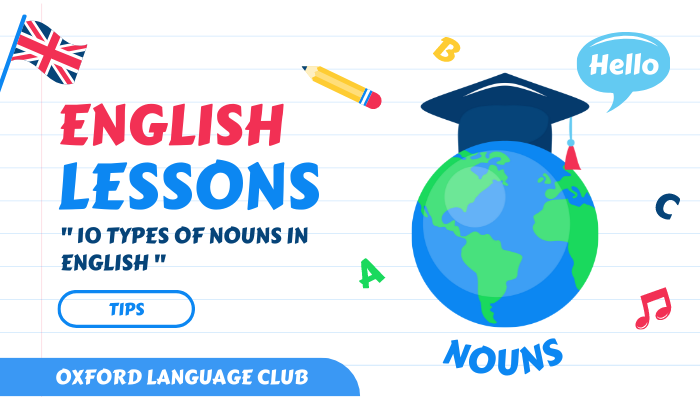Great site to keep my english skills updated for work and travel. I am really enjoying the lessons!
Maria C
 Argentina
Argentina


A noun is a word for a person, place or thing. You already know a LOT of nouns in English, but did you know that there are different types of nouns? That’s what we’ll be learning about today!
Make sure to read to the end because we're going to clarify a very common confusion between categories of nouns that many English learners have.
When it comes to grammar topics like this one, you want to make sure know the essentials of English grammar really well so that you won’t hold onto any bad habits or mistakes as you advance in your English.
OK, let’s see what different types of nouns we have in English. The first two categories are common nouns and proper nouns.
Common Nouns & Proper Nouns
Common nouns are general words for things:
Proper nouns are specific names:
We always capitalize the first letter of proper nouns.
Singular Nouns & Plural Nouns
Next there are singular nouns (talking about one thing) and plural nouns (talking about multiple things).
Some examples of singular nouns are:
Their plural forms are:
For most nouns we form the plural simply by adding -S, but there are exceptions. We add -es to nouns that already end in -s, we add -ies to nouns ending in -y, some nouns ending in an F sound end with -ves in the plural, and then some nouns have irregular plurals like "man/men" and "foot/feet".
Collective Nouns
One interesting type of noun is a collective noun – these words refer to a group of people/things, but are usually treated as singular grammatically. Some examples would be:
These are groups of people, but we say “The team is practicing for the competition,” not “The team are practicing.”
We also have collective nouns for groups of things, such as:
I’d say “The pile of clothes on my bed is getting bigger” – "pile" takes a singular verb, even though it’s referring to many clothes.
Compound Nouns
We also have compound nouns – this is a noun made of two or more words.
Sometimes they are together:
Sometimes they are joined by a hyphen:
Sometimes they are two words:
There’s no rule for this, unfortunately.
Concrete Nouns & Abstract Nouns
Our next pair of categories is concrete nouns – things we can see, hear, smell, taste, and touch – versus abstract nouns, which are more ideas, concepts, emotions, or qualities.
Concrete nouns would include:
Abstract nouns would be things like:
Countable Nouns & Uncountable Nouns
Finally we have countable and uncountable nouns.
Countable nouns are things we can easily separate and count:
Uncountable nouns are things that we can’t easily separate and count:
We never make uncountable nouns plural, so we can’t say "butters" or "advices".
And we don’t use “a/an,” so we can’t say “a rice” or “an advice” – instead, we can say “a grain of rice,” “a bag of rice,” or “a piece of advice.”
DON’T CONFUSE CONCRETE & ABSTRACT WITH COUNTABLE & UNCOUNTABLE
Sometimes students confuse concrete/abstract nouns with countable/uncountable nouns. They think all concrete nouns are countable and all abstract nouns are uncountable – but this is not true. Let me show you some examples:
Review – Types Of Nouns
So our 10 types of nouns are:
Let’s make sure your grammar is correct so that you can use it confidently!